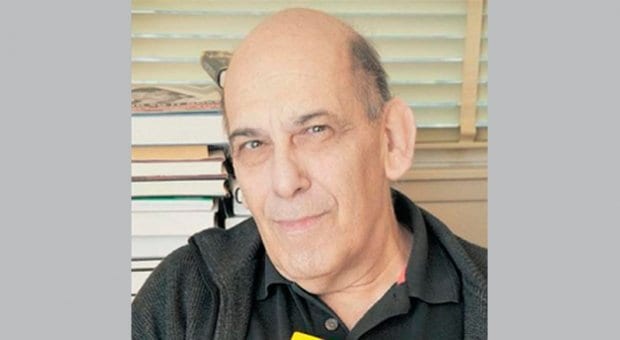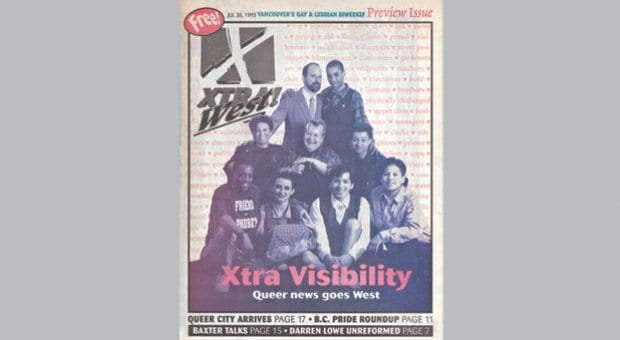
Stan Persky Credit: Courtesy of Stan Persky
The difference between July 1993, when Xtra West newspaper first sashayed down Davie Street in Vancouver, and 2013, 20 years later, is neatly captured by The Judith Butler Footnote to Contemporary Canadian History.
In 1993, there was not only no same-sex marriage in Canada, but even prohibition of discrimination on the basis of sexual orientation in the Canadian Human Rights Act was three years away.
In 1993, AIDS was a murderous pandemic in the Canadian gay community, and drugs to manage it, with strange names, such as “antiretrovirals” and “protease inhibitors,” were not yet on the market.
And in 1993, gay writers like me (I had just published Buddy’s: Meditations on Desire) were still trying to figure out what it meant to be gay.
Fast forward to 2013: Judith Butler is a well-known philosopher, a veteran professor at the University of California, Berkeley, and one of the half-dozen leading thinkers in the world about feminism, lesbianism and queer theory. In May 2013, Montreal’s prestigious McGill University decided to confer an honorary degree on Butler in recognition of her academic accomplishments, which include a bevy of brilliant books about sex, gender and language, beginning with Gender Trouble (1990), Bodies That Matter (1993) and Excitable Speech (1997). Butler became a contemporary Canadian history footnote when some people decided to protest the granting of the honorary degree to the prominent 57-year-old lesbian scholar.
Among the protesters were McGill student groups, a few faculty and big splash anti-Butler op-ed pieces in major rightwing Canadian papers like National Post. Were the protesters upset about Butler being a feminist, an out-front lesbian, a major queer theorist? Not at all.
Even her staunchest opponents were willing to give a grudging nod of recognition to Butler’s sexual views. No, what got their Torah scroll unravelling is that Butler, who also happens to be a Jew, is a supporter of BDS (Boycott, Divestment and Sanctions against Israel) and identifies with “a Judaism that is not associated with state violence,” meaning that she opposes Israel’s treatment of its Palestinian inhabitants and neighbours.
While one doesn’t necessarily have to agree with the boycott-Israel movement (I don’t), it’s a perfectly respectable political position and is hardly cause for denying an honorary degree for lifetime achievement to Butler. The reason, happily, that all this is a mere footnote, is that McGill sees it the same way.
On May 30, 2013, Butler delivered, without incident, an elegant, eight-minute, not particularly controversial commencement address to McGill grads on the virtuous subject of Why Study the Humanities? End of flap.
And that’s one of the differences between 1993 and 2013, when Xtra Vancouver is marking its 20th anniversary as a gay community newspaper.
In 2013, being homosexual in Canada is not an enormously big deal; having controversial views about Middle East politics may well be.
The differences between then and now can, and should, be put in broader terms. Canada in 2013 is “post-gay.”
I mean three things by that: 1) gay identity; 2) gay legal status and 3) public attitudes toward gays, lesbians, bisexuals and transgender individuals.
Once upon a time (as recently as 1993), Canadian homosexuals were preoccupied with figuring out their sexual desires and how those desires affected their identities as human beings. Today, by and large, they aren’t. Homosexuality is pretty much “normal”; it’s just another way of affectionally relating to other people. It is not a cause for anxious pondering, family shouting matches or therapy appointments.
Okay, maybe there’s still more than enough bullying and name-calling in particularly brutal suburban high schools. But even that’s down a bit, thanks to courageous kids who have formed gay-straight alliances in those selfsame neanderthalish centres of learning.
Second, in 1996, Canada included homosexuals in its anti-discrimination Human Rights Act and, in 2005, became the fourth nation in the world to fully legalize same-sex marriage.
Finally, public attitudes have undergone a sea change. People have gotten used to Ellen and Glee and Brokeback Mountain popping up throughout the culture. Young people, in classes I teach at Capilano University, are in favour of same-sex marriage by margins of 75 percent and up. Even their parents and grandparents, by comfortable majorities, think it’s okay, too.
In Canada, individuals who are GLBT (gee, I keep getting that familiar acronym mixed up with bacon, lettuce and tomato sandwiches) can now live ordinary lives without worrying too much about discrimination, legal barriers or even insulting antediluvian public behaviour.
But in case you think I’ve gone all pollyannish in my dotage, I should remind you about the Law of Uneven Development. It’s an old Marxist idea that economies develop differently depending on their particular circumstances and histories. The same is true for culture and sexuality. So, while Canada and parts of Europe are generally post-gay, in other countries you can find situations that are scarifyingly pre-gay or, more likely, just plain gay.
In some countries, such as Uganda, legislatures are recurringly threatening to prohibit gay behaviour and to punish homosexuals, in barbaric forms up to and including death. In other countries, such as the United States, Russia and France, homosexuals are engaged in various phases of gay struggle.
In 2013, the cultural situation for homosexuals is hardly uniform, but progress is undeniable. Of course, even in post-gay spaces, vigilance is required, reflection matters, and we may even still need gay publications like Xtra, east, west, north and south.
But hey, maybe elderly geezers like me who are practically “post-sexual” (and post-everything else) aren’t the right people to ask about all this. Check it out with teens, or just hit the “like” button on your nearest Facebook pro-gay page.
Victory: Get used to it!
An excerpt from Stan Persky’s first Xtra West column
There’s one more group in society to whom we ought to address the cheekily confident gay and lesbian catchphrase of the ’90s, “Get used to it!”
After we’ve duly informed the fundamentalist fanatics, family flagwavers and assorted homophobes that we’re here to stay and they might as well get used to it, maybe we ought to tell ourselves the same thing.
In the nearly quarter-century since the 1969 Stonewall riots on New York’s Christopher Street that now serve as a historical marker for the launch of the movement known as “Gay Liberation,” much has changed.
The main thing that’s changed, of course, is that homosexual behaviour and the people who engage in it have won — mainly through political organizing — a substantial degree of acceptance, both legally and socially, throughout North America.
The short version of the story can be traced in the successive slogans of the past three decades. The “closet” (or was it a coffin?) of the ’50s gave way to the tentatively assertive “Gay is good” of the late ’60s and ’70s. The bravely militant response to AIDS in the ’80s embodied in the phrase “Silence = Death” has produced in the 1990s an assured “Get used to it.”
It’s the offhand war cry of a populace that speaks with a few victories — and whatever else — under its belt.
Yet listening to a goodly portion of official gay and lesbian rhetoric in Canada, you wouldn’t know it.
…
This isn’t the place to draw quickie conclusions about how changing social circumstances will shape our future political strategies. It’s enough, for starters, to recognize the facts — and perhaps also to recognize our own curious unease in the shift from being marginalized pariahs to nearly-partners at the prom.
Getting used to victory doesn’t mean folding our tents — is that what makes some people nervous — and it doesn’t mean turning into pollyannas blubberingly grateful for being invited to the great consumer society. It does mean a clearer-eyed look at what the next steps might be for a proud crowd that sometimes calls itself a community.
—published in Xtra West’s preview issue, July 30, 1993
20 years ago: Some of the stories that made headlines in Xtra West’s preview issue, July 30, 1993
Doctor denies lesbians sperm
Two Vancouver lesbians were refused artificial insemination by the only sperm bank in British Columbia, and the couple says they must travel to the US to find a safe, anonymous sperm donor.
Queer City event too gay for gallery
A Vancouver art gallery isn’t participating in the upcoming Queer City arts festival because its top board members think it could harm their reputation. Although board members at Exposure Gallery say the decision was an artistic one, the official record of a recent board meeting shows that senior board members think Queer City’s art is “too gay” and “too political.”
Vancouver Pride marches on
Despite the recent death of Malcolm Crane and continued pressure to join the Stonewall Festival for a single event in June, Vancouver’s Pride Parade Committee is marching on with the 16th annual Pride Day parade and concert Aug 2.
Darren Lowe gets axe in Vancouver Centre
Was Darren Lowe dumped by the Reform Party because of his past involvement in the gay community? It’s a question mainstream reporters and West End residents have pondered for weeks, but so far the 28-year-old city employee refuses to respond to overwhelming evidence of his activism.

 Why you can trust Xtra
Why you can trust Xtra


